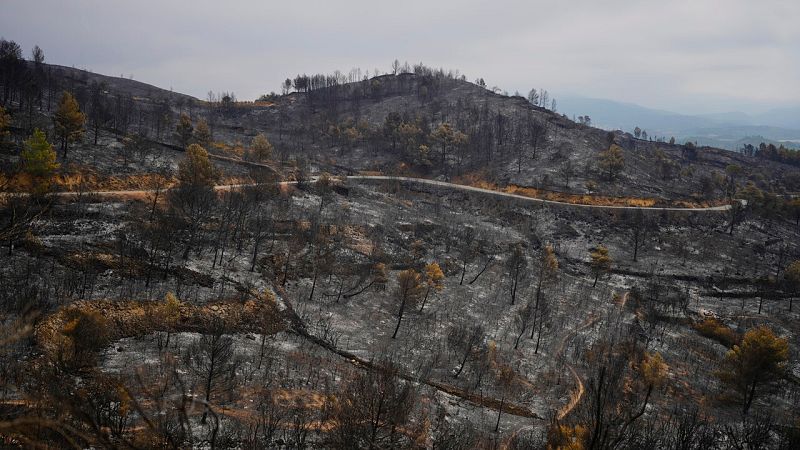
Firefighters Combat Wildfires Across Southern Europe Amid Record Heat
Wildfires are intensifying across southern Europe as the region experiences record-breaking temperatures. Firefighters from multiple countries are working tirelessly to contain blazes that have already caused significant damage and loss of life.
In France, approximately 1,400 firefighters were deployed in the Aude region on Saturday to prevent what is considered the country's largest wildfire in decades from reigniting. Residents who had been evacuated were allowed to return to their homes after authorities confirmed that the fire was contained since Thursday. The blaze, which burned over 160 square kilometers in a wooded area known for its vineyards, has left one person dead and 25 injured, including 19 firefighters.
Despite the containment, officials warned that the fight is far from over. Authorities have reopened all roads but imposed a strict ban on forest access. Col. Christophe Magny, director of the Aude firefighters department, emphasized that the fire will not be fully extinguished for several weeks due to ongoing hotspots. High temperatures are expected to persist, complicating efforts further.
Meteo France placed the southern half of the country under a "high vigilance" alert for heat waves, with temperatures reaching up to 39°C in the Aude region on Saturday.
Ongoing Fires in Spain and Greece
Firefighters in Spain are also dealing with an active wildfire in Avila province. The fire began on Friday afternoon, prompting the Spanish Military Emergencies Unit (UME) to work through the night to control it and prevent it from approaching roads and train lines. Temperatures in parts of Spain and Portugal have reached close to 39°C, creating extreme fire risks.
The heatwave is expected to continue until at least next Wednesday, according to Spain's national weather service AEMET. In Greece, a large wildfire erupted in Keratea, southeast of Athens, on Friday afternoon. It spread across eastern and southern Attica, causing significant damage to homes and claiming one life. Authorities issued evacuation orders as the fire approached residential areas, while firefighters battled strong winds.
At least 260 firefighters, supported by 77 vehicles, were involved in containing the blaze, with numerous volunteers assisting in affected areas.
Wildfire in Turkey Under Control
In Turkey, wildfires in the central districts of Canakkale and the Bayramic area have been largely brought under control, according to Agriculture and Forestry Minister Ibrahim Yumakli. Firefighting teams worked throughout the night to halt the advance of the blazes. The fires, which started near Yigitler village and spread to a forested area under strong winds, prompted precautionary evacuations in several villages.
A total of 654 residents were relocated to safe zones. Authorities reported that four suspects have been taken into custody as part of investigations into the cause of the fires.
A New Normal for Southern Europe
Southern Europe has experienced multiple large wildfires this summer, raising concerns about the increasing frequency and intensity of such events. Scientists attribute this trend to climate change, which is exacerbating heat and dryness, making the region more vulnerable to wildfires.
The UN World Meteorological Organisation (WMO) released a report detailing the global impact of extreme heat. It found that approximately 489,000 heat-related deaths occurred annually between 2000 and 2019, with 36% occurring in Europe. This record-breaking July saw Turkey set a new national high of 50.5°C, while Sweden and Finland experienced unusually long periods of temperatures above 30°C.
The WMO warns that countries must act faster to adapt to climate change and limit global warming, aligning with the 2015 Paris Agreement. Ko Barrett, Deputy Secretary-General of the WMO, stated that extreme heat is often referred to as the "silent killer," but with modern science and technology, these deaths are preventable.
Joy Shumake-Guillemot, lead of the WHO-WMO Climate and Health Joint Programme, emphasized that the issue is not just climate-related but a public health emergency. She noted that scaling up heat-health warning systems in 57 countries could save nearly 100,000 lives annually.
